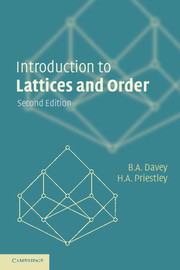Book contents
- Frontmatter
- Contents
- Preface to the second edition
- Preface to the first edition
- 1 Ordered sets
- 2 Lattices and complete lattices
- 3 Formal concept analysis
- 4 Modular, distributive and Boolean lattices
- 5 Representation: the finite case
- 6 Congruences
- 7 Complete lattices and Galois connections
- 8 CPOs and fixpoint theorems
- 9 Domains and information systems
- 10 Maximality principles
- 11 Representation: the general case
- Appendix A: a topological toolkit
- Appendix B: further reading
- Notation index
- Index
9 - Domains and information systems
Published online by Cambridge University Press: 05 June 2012
- Frontmatter
- Contents
- Preface to the second edition
- Preface to the first edition
- 1 Ordered sets
- 2 Lattices and complete lattices
- 3 Formal concept analysis
- 4 Modular, distributive and Boolean lattices
- 5 Representation: the finite case
- 6 Congruences
- 7 Complete lattices and Galois connections
- 8 CPOs and fixpoint theorems
- 9 Domains and information systems
- 10 Maximality principles
- 11 Representation: the general case
- Appendix A: a topological toolkit
- Appendix B: further reading
- Notation index
- Index
Summary
This chapter contains material at the interface between order theory and computer science. It discusses domains – those CPOs in which each element is the supremum of its ‘finite’ approximations – paralleling the discussion given in Chapter 7 of the class of algebraic lattices lying within the class of complete lattices. These domains provide a setting for denotational semantics, in a way we outline in 9.33. An alternative approach to domains, via information systems, is also presented. The final section of the chapter returns to fixpoint theory, and shows how the theorems in Chapter 8 can be applied in the solution of recursive equations, and in particular domain equations.
Domains for computing
This section brings together the notions of directed joins and of finite approximations.
Definitions. Let S be a non-empty subset of an ordered set P. Then S is said to be consistent if, for every finite subset F of S, there exists z ∈ P such that z ∈ Fu.
Remarks. Non-consistency arises only in ordered sets without ⊤. A directed set is, of course, consistent. The difference between the two notions is in the location of upper bounds: for D to be directed we require every finite subset F of D to have some upper bound which is a member of D, but for consistency an upper bound in P suffices.
Information
- Type
- Chapter
- Information
- Introduction to Lattices and Order , pp. 201 - 227Publisher: Cambridge University PressPrint publication year: 2002
